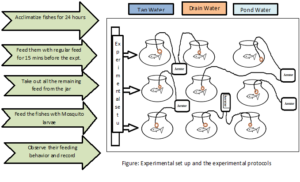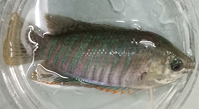Prof Harunur Rashid and his student Chhimi Lhamo recommends ‘Biological Control of Mosquito Larvae Grown in Waterlogged Environment using Larvivorous Fishes‘ and the research findings were was presented during BAPA-BEN Special Conference on Flood, Waterlogging and Landslides held at Dhaka (12-13 January 2018).

Waterlogging throughout tropical Asia is one of the key reasons behind vector-borne diseases in humans and mosquito is the main vector transmitting these diseases among humans. Therefore, mosquito control, in urbanized societies in particular, is none of the main concerns of public health. Biological control is one of the most effective and convenient methods used against insecticides for urban mosquito control and use of larvivorous fishes are one such popular method. In this research, a series of laboratory experiments compared predation rates of three native fish species (Banded Gourami (Trichogaster fasciata), Slender Rasbora (Rasbora daniconius) and Zebrafish (Danio rerio)) with two exotic fishes (Mosquito fish (Gambusia affinis) and Guppy (Poecilia reticulata)) on mosquito larvae to determine their potential as biological control agents along with their survival rate in three types of water (tap water, pond water and drain water).

Of the three native species, Banded gourami showed the greatest potential as a mosquito control agent, having consumption of mosquito larvae comparable to that of exotic guppy and Mosquito fish and a complete survival for 7 days of exposure to different types of water especially in drain water and was the only species that showed a significant amount of mosquito larval consumption even in the night experiments.
Feel free to read our book chapter published from this research: Lhamo C, Rashid H. 2018. Biological control of mosquito larvae grown in waterlogged environment using larvivorous fishes and comparison of efficiency between native and exotic fish species. In: M.S. Islam and M. Khalequzzaman (editors), Floods Waterlogging and Landslides in Bangladesh, Bangladesh Poribesh Andolon (BAPA), Dhaka, Bangladesh, pp. 110-137.
